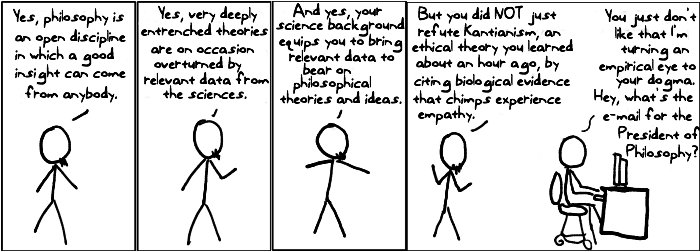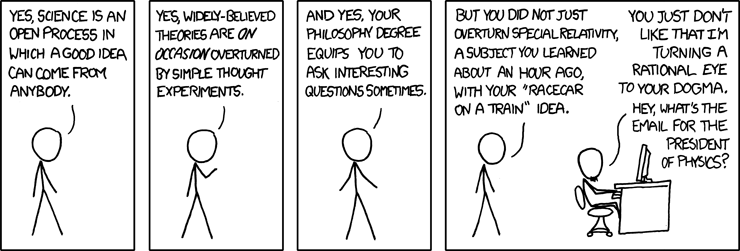I'm looking over the
PhilPapers survey results. My first reaction is of only mild curiosity. I certainly understand the common reaction that this is silly. I mean, though it's interesting, it's not
as interesting as this historical article about Mendel's legacy that I have sitting on my desk.
What surprises me is how far I am from knowing what and how my colleagues think. We're talking to each other all the time but also playing games, putting forward our adversaries' arguments and saying that someone argues this position, but surely not you. On a side note, I visited a colleague's (and collaborator's) Modern classroom last week for a discussion on the Meditations. What I discovered is that my colleague (an epistemologist) teaches the Meditations as having proposed the undermining form of global skepticism that has plagued Western culture for centuries whereas I teach the Meditations as having prepared the ground for the development of the methods of modern science. So which are they: an epistemological hazard or a stepping stone of the Enlightenment? And how can it be that they two of us, so close in so many ways, can have such divergent views of a canonical text?
This surprise at discovering the diversity among my colleagues' views follows me through the PhilPaper survey results. Let's look at
the phil-sci questions.
I understand that realism has been on an upswing over the last decade or two. Indeed, the
Stanford Encyclopedia says "the majority of contemporary philosophers are realists about laws [of nature]." Still, my view is that, first, the dichotomy conveys little about how science is done because there are concepts toward which scientists take a non-realist view and others towards which they take a realist view, depending on subtleties of the concept and the work it does in a theory. To take a simple example, biologists refer unproblematically to ecosystems but none of them would insist that there are identifiable ecosystem boundaries. Rather, what counts as an ecosystem is contextual or, as we philosophers might say, constructed for a specific purpose. I would therefore hold that the appropriate attitude toward
some central concepts and the laws that make use of those concepts is anti-realist. Assuming that realism is thorough-going and doesn't permit this pick-and-choose attitude, I suppose that I (and lots of ecologists) are anti-realists, though I'd be more comfortable saying "other" and even arguing that this is a distinction that matters for little to anyone outside of philosophical circles.
75% of my colleagues are realists. Only 12% are anti-realists.
The question about Humeanism and laws of nature is one I'd have to opt out of, but now I know that 57% of my colleagues are non-Humean. Only 25% are Humean.
However, taking a closer look at some of the results, it seems that
the answers of specialists diverge from these results. Indeed, among philosophers of science, more tend to be anti-realist and more tend to be Humean than among philosophers more generally.
There's another interesting way of looking at this that is left in the gaps--that is, in the Other category. Among all philosophers, 87% were willing to classify themselves as realist or anti-realist, but among philosophers of science, this dichotomy appears more treacherous, and only 76% were willing to take a stand.
The opposite is true on the question regarding laws of nature: philosophers of science were more likely than other philosophers to place themselves in one camp or the other but were close to evenly split between them. That is, 49% of philosophers of science are non-Humean and 41% are Humean, but the general split was 57/25.
I'm curious whether some of these views come as packages. E.g. are the few anti-realists also contextualists and deflationists and naturalists?
I'd also like to see a question about the source/existence of human rights and one on the environmental philosopher's question of the source of the value of nature: anthropocentric or not?
There is a running list of blog posts
here.

